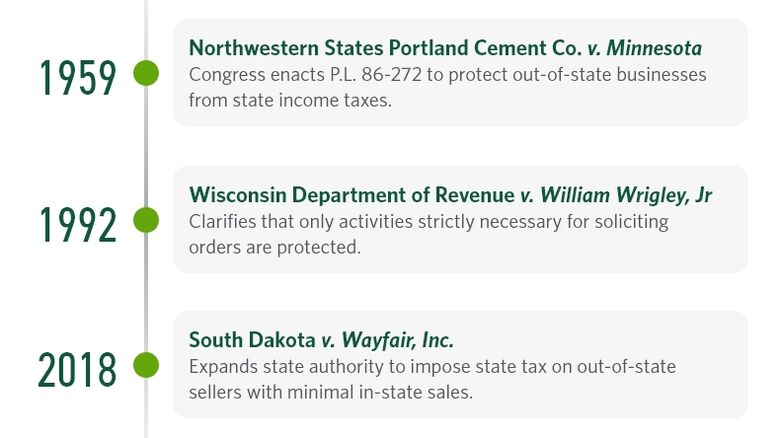For nearly seven decades, Public Law 86-272 or P.L. 86-272 has largely protected out-of-state businesses from state income tax liability when their only in-state activity is soliciting sales of tangible personal property. However, as transactions — both physical and digital — shift and continue to shift online, so too does the tax landscape, prompting states to reexamine these protections, as seen through the Wayfair decision, Multistate Tax Commission (MTC) revisions, and, more recently, the Interstate Commerce Simplification Act of 2025, to name a few.
P.L. 86-272 offers a critical, but narrow, defense for businesses against expansive state income tax regimes. In this sense, certain sales of goods and other online transactions may not always be protected by P.L. 86-272, and therefore, it is essential for businesses to understand evolving state tax rules and interpretations.
What Is Public Law 86-272?
The Interstate Income Tax Act, also called Federal Public Law 86-272 (P.L. 86-272), was enacted in 1959, designed to protect the interstate commerce of out-of-state businesses. It was initially created to prevent states from imposing income taxes on certain sellers of tangible personal property, where the business performed limited activity within its borders.
In short, to qualify for protections under P.L. 86-272, a business must:
- Face a state net income tax
- Operate as an out-of-state entity
- Limit in-state business activities solely to the solicitation of sales orders
- Ensure all orders are approved and fulfilled by shipment or delivery from a point outside the state
- Sell only tangible personal property (i.e., clothing, vehicles or business equipment), not intangible (i.e., services or digital goods)
Defining “Solicitation of Orders” Under P.L. 86-272
P.L. 86-272 does not explicitly define the phrase “solicitation of orders,” and has not been amended by Congress since its passage more than 65 years ago, despite the emergence of digital services and e-commerce that dominate the current business landscape.
The Supreme Court has held the stance that “solicitation of orders” includes “(1) activities that are strictly essential to making requests for purchases, and (2) ancillary activities that serve no independent business function apart from their connection to requests for purchases,” following the Wisconsin v. Wrigley ruling. However, the ambiguity surrounding the meaning of “solicitation of orders” has led to a myriad of interpretations at the state level regarding business activities that fall within and outside the scope of protection afforded by P.L. 86-272.
Recent Legislative Developments of P.L. 86-272
Recent federal legislative developments, including the Interstate Commerce Simplification Act of 2025 (H.R. 427), which was introduced January 15, 2025, are aimed at bringing P.L. 86-272 to the digital age by expanding the definition of “solicitation” to include business activity that “may also serve some independently valuable business function apart from solicitation.”
The effect of the expanded definition would significantly broaden the protections afforded by P.L. 86-272 and curtail the ability of states to adopt the MTC’s 2021 interpretation of P.L. 86-272 to impose income taxes on out-of-state businesses using many common website and application features. However, H.R. 427 was not ultimately included in the final version of the FY2025 Reconciliation Law (P.L. 119-21).
History of P.L. 86-272 and the Courts
P.L. 86-272 traces its origins to pivotal court decisions and the shifting landscape of interstate commerce. Over time, landmark cases and the rise of digital trade have continually shaped its interpretation.

Northwestern States Portland Cement Co. v. Minnesota
Congress enacted P.L. 86-272 in 1959 as a direct response to the Supreme Court’s ruling in Northwestern States Portland Cement Co. v. Minnesota, 358 U.S. 450, which permitted states to impose income taxes on out-of-state businesses if such taxes were fairly apportioned and nondiscriminatory. Amid concerns over the impact on interstate commerce, lawmakers designed P.L. 86-272 to temporarily shield businesses from these new tax burdens while seeking longer-term solutions.
Wisconsin Department of Revenue v. William Wrigley, Jr. Co.
The Supreme Court’s decision in Wisconsin Department of Revenue v. William Wrigley, Jr. Co., 505 US 214 (1992) clarified the extent of the protections offered by P.L. 86-272. The Court ruled that the law shields out-of-state sellers from state income tax only for activities that are strictly necessary to “soliciting orders” for tangible personal property.
Importantly, the decision established that if a business’s in-state activities go beyond simple solicitation — by including services or functions with their own business purpose — then P.L. 86-272 does not provide immunity from state income tax. This landmark case shaped the modern understanding of what constitutes protected versus unprotected business activity under P.L. 86-272, narrowing the scope of its immunity and guiding both states and businesses in interpreting the law’s application.
South Dakota v. Wayfair, Inc.
In South Dakota v. Wayfair, Inc., 138 S. Ct. 2080 (2018), the U.S. Supreme Court expanded a state’s ability to apply nexus to impose sales tax collection requirements on out-of-state sellers when relatively minimal sales are made into the state. Nexus is the threshold of connection a business must have with a state before that state can impose income tax obligations.
P.L. 86-272 protects out-of-state sellers of tangible personal property from state income taxes, provided their in-state activities are limited solely to soliciting sales, and all sales are approved and shipped from outside the state. This federal law serves as a safeguard for businesses, ensuring that minimal in-state activity does not automatically trigger income tax liability.
However, states have continually sought to narrow the scope of P.L. 86-272, especially as digital commerce has evolved. The Multistate Tax Commission (MTC) plays a key role in shaping nexus standards. In 2002, the MTC defined “substantial” nexus for income tax purposes as either $500,000 or 25% of a company’s sales made into a state. While most states have not adopted a specific sales threshold, this definition provides a guideline for determining when a business’s economic presence in a state is sufficient to create tax obligations.
With the expansion of nexus principles following the Wayfair decision, states have become more aggressive in asserting tax authority, often using lower sales thresholds than those recommended by the MTC. In this environment, P.L. 86-272 remains a critical, though increasingly contested, protection for businesses engaged in interstate sales of tangible goods.
MTC Model Rule Leads to Confusion for P.L. 86-272
On August 4, 2021, the MTC adopted revisions to its “Statement of Information Concerning Practices of Multistate Tax Commission and Supporting States Under Public Law 86-272”. Some member states later adopted those revisions to the interpretation of the law, with examples of protected and unprotected activities occurring over the internet.
Many of the common interactive website and mobile platform activities cited in the MTC’s updated interpretation, such as post-sale assistance with customers via chat or email, certain “cookie” enabled features, and the ability for a prospective non-sales employee to upload a resume on a company’s careers page, arguably go beyond mere solicitation, and as a result, exceed the protection of P.L. 86-272, exposing out-of-state sellers of tangible personal property to the imposition of income taxes by a state that adopted the MTC’s 2021 revisions.
The most troubling aspect within the MTC’s revisions, at least from an economic nexus standpoint, relates to activities occurring over the internet, as described in the following excerpt:
Article IV, Section C (in part):
“As a general rule, when a business interacts with a customer via the business’s website or app, the business engages in a business activity within the customer’s state. However, for purposes of this Statement, when a business presents static text or photos on its website, that presentation does not in itself constitute a business activity within those states where the business’s customers are located.”
The statement goes on to indicate that post-sale assistance provided through an online chat feature, and the ability of a prospective non-sales employee to upload a resume, are included in the activities that may result in a loss of federal law protection. Essentially, any activities conducted through the internet, other than assisting with the sale of tangible personal property (i.e., listing products, shopping cart), may now create nexus for out-of-state sellers.
States’ Interpretations of the MTC Model Rule
Although the MTC’s statement represents an interpretation of existing law, states are not prevented from applying this new approach to unprotected activities retroactively. As the first states to issue guidance, California and New York have been at the forefront of P.L. 86-272 interpretation.
Other states have and are expected to continue evaluating and potentially adopting the MTC’s revised standards. Nonetheless, businesses should be aware that state tax authorities may raise these issues in audits covering prior years.
California
California was the trailblazer in issuing official guidance that adopts the MTC's revised Statement on P.L. 86-272. The California Franchise Tax Board has outlined specific scenarios in which internet-enabled business activities exceed the scope of mere solicitation, thus voiding immunity under P.L. 86-272. This includes features like online chat support, cookie-based data collection for tailoring inventory, and even allowing non-sales job applicants to submit resumes via company websites.
New York
New York has also embraced the MTC’s updated model, signaling a broader interpretation of what constitutes taxable business activity in the digital age. New York’s Department of Taxation and Finance has issued guidance aligning with the MTC’s approach, meaning businesses with interactive websites that engage with in-state customers may find themselves subject to increased scrutiny and potential tax liabilities.
Minnesota
Minnesota has followed suit, with its Supreme Court ruling and administrative actions highlighting the erosion of traditional immunities under P.L. 86-272. The state recognizes that market research and other customer-facing activities conducted by in-state representatives, especially when augmented by digital tools, may render companies liable for income taxes.
New Jersey
New Jersey, another key market with a sophisticated approach to state taxation, has updated its guidance to reflect the MTC revisions. The New Jersey Division of Taxation has clarified that remote assistance, online customer engagement, and other interactive website features are all considered in-state business activities for purposes of determining tax obligations.
Oregon
Oregon’s adoption of the MTC revisions is reflected in recent judicial decisions and administrative guidelines. The state has underscored that incentive agreements with in-state wholesalers and other interactive, post-sale activities performed digitally by out-of-state sellers constitute business activities that fall outside P.L. 86-272 protections.
Your Guide Forward
So, where are we today? Businesses should carefully consider their state operational footprint and laws that can minimize their exposure to income taxes on an annual basis at a minimum, and with special consideration during periods of rapid growth when entering new markets or utilizing a remote workforce.
Cherry Bekaert’s State & Local Tax (SALT) team helps businesses operating in the multi-state environment utilize the protections provided by the federal law with a consultative approach that navigates the various state interpretations of P.L. 86-272 and applies them to their operations across multiple jurisdictions.
If your business relies on P.L. 86-272 to shield the business from state income tax, take a hard look at what specific company activities (physical, economic and digital) are occurring, or are presumed to be occurring, in each state. During your review, if you discover areas of concern, be sure to address them promptly. Most states offer favorable terms for resolving past issues if prior exposure is discovered. Our SALT professionals can assist in reviewing and remediating your nexus position.







